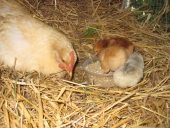





 3
3




“Action on behalf of life transforms. Because the relationship between self and the world is reciprocal, it is not a question of first getting enlightened or saved and then acting. As we work to heal the earth, the earth heals us.” ~ Robin Wall Kimmerer
 5
5




John Daley Bendigo, Australia The Enemy of progress is the hope of a perfect plan
Benefits of rainfall collection https://permies.com/t/88043/benefits-rainfall-collection
GOOD DEBT/ BAD DEBT https://permies.com/t/179218/mortgages-good-debt-bad-debt
 4
4




Heather Sharpe wrote:My chickens seem to be having a hard time figuring themselves out at bed time. They are starting to go into the coop on their own, though not all of them are cooperating with that. Even when I try bribing them with grubs. The real problem though is that once they're in the coop with me, several of them panic and jump all over me. They seem genuinely afraid when they do this, even jumping on each other on top of me. It's also scary for me, as they have jumped on my face several times trying to get on top of my head, leaving some gnarly scratches and getting dangerously close to my eyes. Usually I can get them all to go on the perch eventually, but it seems like a serious struggle. It makes me wonder if there is something going on that is making them so distraught. It also worries me because at some point, we'd like to be able to go on short trips that would require a friend putting the chickens to bed. With the way they're acting now, I feel like that would be hazardous and I couldn't ask someone to do it.
I have to go into the coop with them, because we have two roosters that have their own separate area within the coop that I can only access from inside. The boys are separated because they have yet to learn to behave themselves and knock the hens off the perch.
The chickens are nearly 7 months old at this point. They did sleep in the house for a long time, due to some hold ups in building their coop. Maybe they got used to going in the house and are scared cause they aren't there? The chickens who are having the most issues are the ones who are most cuddly and friendly, for what it is worth. It is usually the same three that have the most trouble. It's possible they are lower in the pecking order, but this behavior seems extreme and I haven't seen any bullying during the day.
Any ideas why they might be acting this way? Suggestions of how to help them calm down and roost without a struggle?
Spero Meliora
 8
8




Visit Redhawk's soil series: https://permies.com/wiki/redhawk-soil
How permies.com works: https://permies.com/wiki/34193/permies-works-links-threads
 3
3




Invasive plants are Earth's way of insisting we notice her medicines. Stephen Herrod Buhner
Everyone learns what works by learning what doesn't work. Stephen Herrod Buhner
 7
7




 2
2




Lorinne Anderson: Specializing in sick, injured, orphaned and problem wildlife for over 20 years.
 2
2




Alex Moffitt wrote:I recommend, studying about how to read animal language,
I have a cousin who loves animals more than herself sometimes, she works testing Products on animals, she believes if she does it she can try and change the way things are run to help the animals from the inside.
she has taught me a lot about animal phycology, they are much like humans, your initial quote can seem like your were talking about children.
So I advice you to realise you have a problem with children and be a mother hen then!
Jay Angler wrote:1. Do they have access to feed all day long? I have a feeder hung above the perches, so the birds associate "bed time" with "food time". If they don't have a lot of forage available, you could give them "lunch" but then remove the feed to a garbage can until you hang it at bedtime.
2. Do you see any sign of predators/mice/rats in the coop? Are you sure it's secure?
3. When I ended up having to be "mother duck" to 3 Muscovy ducklings, they *really* needed their after dinner snuggle time. Since you've identified some are particularly cuddly, maybe you need to have some late afternoon "cuddle time" to meet that need before bedtime? My ducks outgrew that stage well before 7 months, but they had access to adult ducks by about 4 weeks, even though they spent a lot of time in the house until later than that.
4. Have you checked the birds and the perches for lice? They can catch them from wild birds, particularly in the fall. Several times that I've had people complain about trouble with bedtime and perching, the perches were covered in lice. It's good to get an identification as different bugs respond to different treatments.
Anne Miller wrote:I like Jay's advice.
Here are some of my thoughts:
We usually only go into the coop to get eggs in the morning when the chickens are not in the coop.
At bedtime, put some food in the coop then try letting them make their way to the coop by themselves. You have to use the "bread crumb" method to help them find the food.
Can the roosters find their way to their area by themselves?
My suggestion is to try to get them to learn the routine by themselves.
J. Hunch wrote:I agree that manually putting them in the coop isn't sustainable. What's their default behavior if you don't intervene? It's hard to watch chickens jockey for position on the roost, but as long as no one is getting injured from the fighting (or ends up sleeping in a place that's unsafe for them), there's nothing unusual about some squabbling at night. I recommend trying not to intervene until late twilight for at least a night or two, including not isolating your roosters. See where everyone ends up. Even if some hens try to sleep on the floor or outside the coop, they're a lot easier to move when it's dark -- chickens have worse night vision than humans and tend to go still in the dark rather than try to run blindly.
Aside from the good advice already offered in this thread, my number one suggestion is to evaluate your coop. Is there enough room on the perch? Is it easy for your birds to fly up to? Is the light level in the coop so low in the evening that they can't see the perch clearly? If it's really dark in there, they might not recognize you when you come in, causing them to think you're a predator and panic (talking to them when you're in there can help with this). I don't know exactly what your coop is like, but adding a second perch can help if certain birds are getting bullied off of the highest one. You could also try putting vertical bars along the roost to keep them from pecking/ramming each other on there.
Alternatively, you could try removing the roosters from the situation completely for a day or two and see whether or not that solves the issue. A really good rooster will help mediate conflicts between hens instead of making them worse. If they're vicious enough that you're seriously worried they'll injure the hens, they might not be suited to being part of the general flock.
Lorinne Anderson wrote:Basing my thoughts on animals in general rather than chickens specifically...
Do you own or know someone with a "trail cam"? This would give you some insight as to what occurs when you are not there at night and could be your eyes during the day, also. At night it would answer if the issue is something from outside making them feel unsafe (rodents etc.) OR if it is a hen situation of personality clashes; same during the day.
It may not provide the answer, BUT might at least exclude possible issues.
Less informative, but often easier to borrow or pick up cheap is a baby monitor. At least it would allow you to HEAR if something is upsetting them in the night.
Can you post pictures of the coop?
“Action on behalf of life transforms. Because the relationship between self and the world is reciprocal, it is not a question of first getting enlightened or saved and then acting. As we work to heal the earth, the earth heals us.” ~ Robin Wall Kimmerer
 8
8




 3
3




Leora Laforge wrote:It seems likely to me that your roosters could be trying to overbreed and bully your hens. I have had pullets get very concerned about going into the coop when multiple horny roosters are waiting at the door. This fall I introduced 3 new roosters to my flock of 27 hens. When I let them all try to free range together, after their initial quarantine, the rooster were bullies. I ended up introducing them 1 at a time, over the course of a week. They were much better behaved this way, my flock pretty much gets along now. The roosters even call the hens over when they find a good treat.
I believe you said you have 6 hens and 2 roosters. That is probably too many roosters, for most chickens you want 6-12 hens per rooster. Highly active breeds, like leghorns its closer to 12, for less active breeds, like silkies, closer to 6.
I have also had chickens fly up onto my shoulders when they are looking for a place to roost in the evening. Luckily I am tough to startle so I let it sit there a bit and eventually set it down on the perch.
“Action on behalf of life transforms. Because the relationship between self and the world is reciprocal, it is not a question of first getting enlightened or saved and then acting. As we work to heal the earth, the earth heals us.” ~ Robin Wall Kimmerer
 3
3




“We can complain because rose bushes have thorns, or rejoice because thorn bushes have roses.” — Abraham Lincoln
 2
2




“Action on behalf of life transforms. Because the relationship between self and the world is reciprocal, it is not a question of first getting enlightened or saved and then acting. As we work to heal the earth, the earth heals us.” ~ Robin Wall Kimmerer
 2
2




"Chickens are simple, not stupid," according to #2 Son - they do learn human body language and voice intonation, even if they don't understand high level discussions. So I'm not surprised that they're learning that you don't mind shoulder perching, but you do mind them jumping right at your face. If chickens can distinguish between, "good to eat" and "not good to eat" in the bug department, given patience and training, they can learn to work with you.Heather Sharpe wrote:Thank you for the idea, Jen! I have considered making them a separate coop. I worry a little that they would crow a lot more if I did that, as they get very upset when they can't see or be near the girls. We're still working out if/how they can be integrated into the flock and even though it's not ideal, the current setup seems like the best we can figure out for now.
The girls seem more able to put themselves to bed lately. I do still like visiting them in the evening. The ones who want cuddles are beyond adorable. They always want to hide their little faces in my coat hood. Sometimes there'll be one on either shoulder and one that I'm holding in front of me, so my whole face is surrounded in fluffy feathers. I'm not sure if they've mellowed out or if I've just gotten better at dissuading them from jumping at my face. But it's seeming more manageable.
Visit Redhawk's soil series: https://permies.com/wiki/redhawk-soil
How permies.com works: https://permies.com/wiki/34193/permies-works-links-threads

| I agree. Here's the link: http://stoves2.com |



